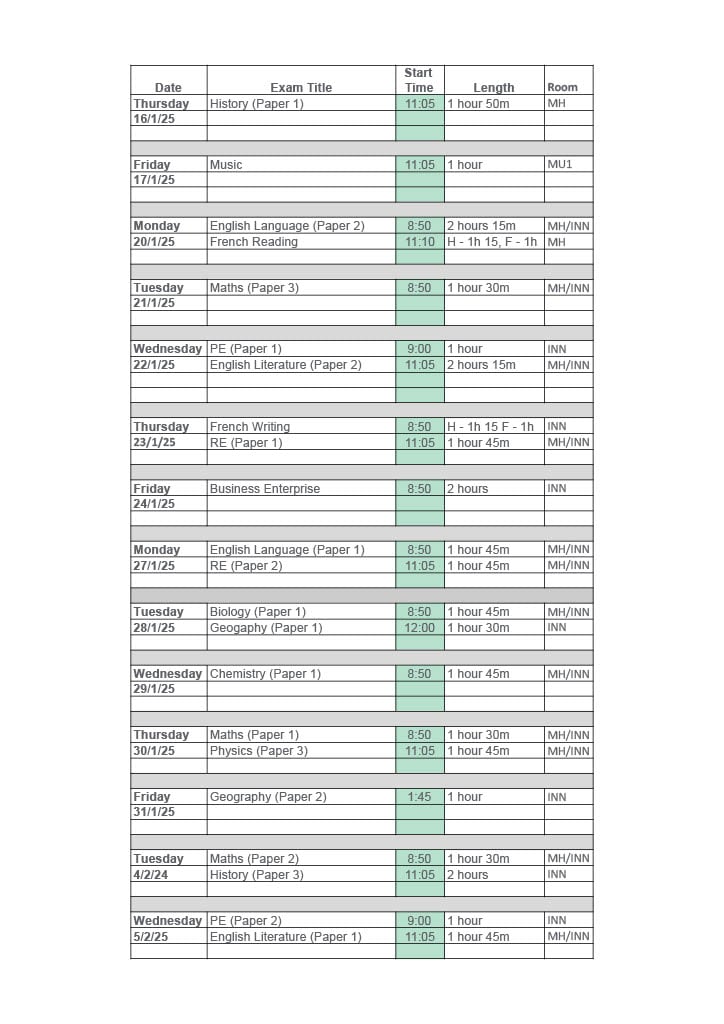
Thank you so much for taking part in our Chain of Cheer Challenge for Action for Children’s Secret Santa Appeal. We are so impressed with your festive bunting. Together, the Thrive community has created over 3,317m of Christmas cheer! Because of your generosity and care, we are able to provide gifts and warm clothing for children in need this Christmas.
Duke’s AEN department has been taking part in the festive chain of cheer. With a total of 121 flags coloured and drawn our banner wraps around the AEN department and is 25.7m’s long. Our students have really enjoyed taking part this.




Social media apps such as TikTok and Instagram are immensely popular among children and young people: Ofcom found that 96% of children have their own profile on at least one of these platforms by the age of 17. These apps feature short-form, algorithmically tailored content ensuring that their users spend as long as possible viewing posts and videos.
As parents and educators, it is vital for us to safeguard the children in our care if – or more likely, when – they use social media. However, the question then becomes “what exactly can we do?” This week’s expert-led guide is here to answer precisely that, offering top-level advice on keeping children and young people safe as they navigate the digital landscape.
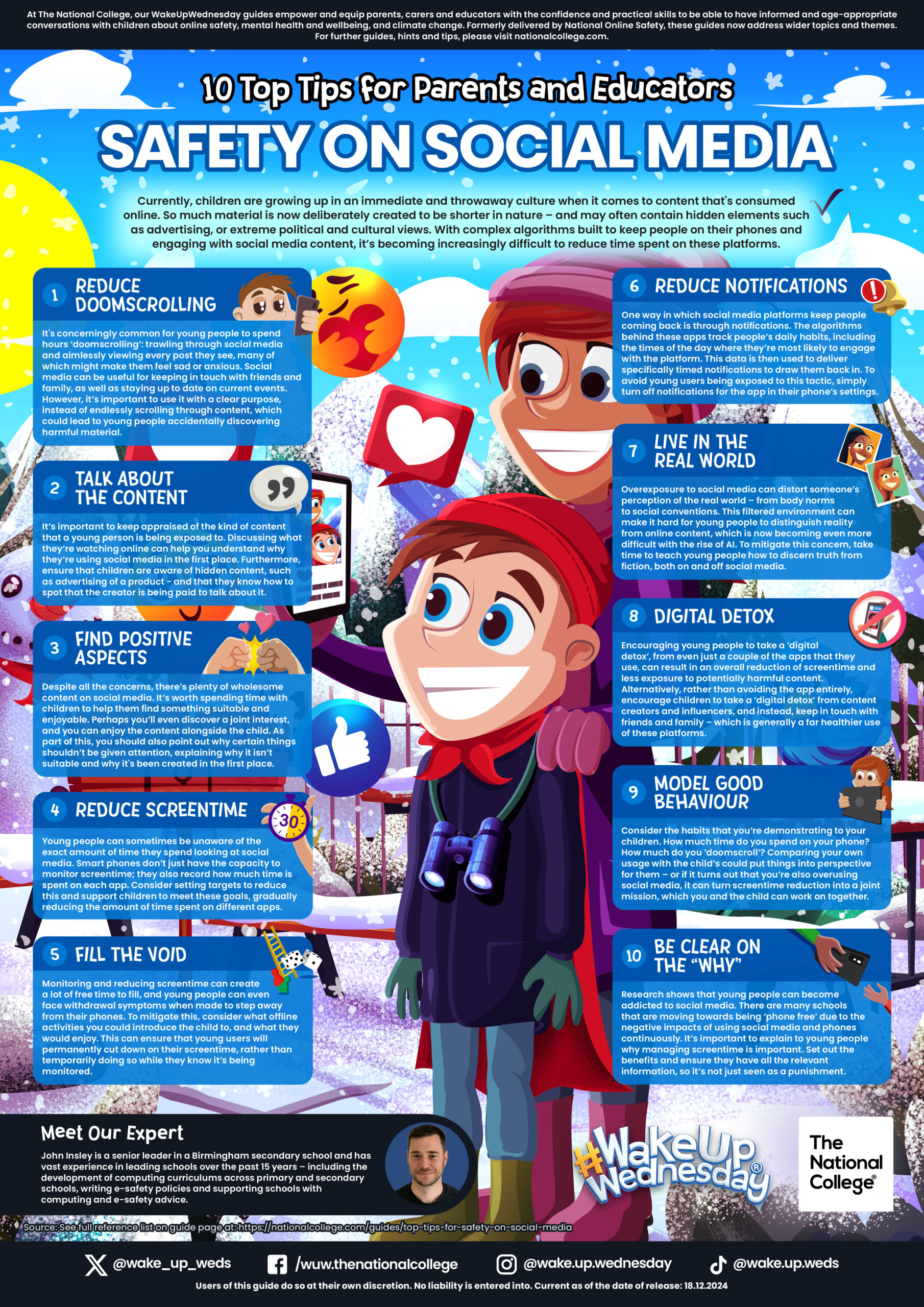
 It was brilliant to welcome back Alex Brown this morning who did a Q+A with Y11 in assembly. Alex is now a qualified physiotherapist working in respiratory care at Cramlington hospital.
It was brilliant to welcome back Alex Brown this morning who did a Q+A with Y11 in assembly. Alex is now a qualified physiotherapist working in respiratory care at Cramlington hospital.
Alex shared the following advice (please cascade to students):
1. How did you manage to be successful in your GCSE’s?
-The key is being organised and disciplined enough to stick to your schedule, even when you don’t want to.
-You have to learn how to prioritise the most important things but also manage your time well enough to ensure you cover everything you need to while having some free time for something you enjoy. I would then put all of this in a time table to keep track of it and get myself into a routine.
-When I was boxing for England, training was on Saturdays and Sundays so I didn’t have time to do work on the weekends. I had to make the most of my time in lessons to get as much done as possible as well as using any free time in school (like tutor) to get any additional work/ revision/ homework done.
-Any work I didn’t finish in school I would do as soon as I got home before I had the chance to get distracted by something else or went to boxing training. I would also do any homework/ revision straight away rather than leaving it to the last minute so I didn’t forget about it and have to rush around to get it finished.
-Making to-do lists and time tables were really handy, especially in A level to keep on top of all my work. Or even setting aside an hour each week straight after school to get any homework done or make revision materials.
-if you struggle with staying on track, use your phone calendar and reminders. Also set your phone to be in ‘work’ mode in your set aside time – in iphones you can set this to be at a specific time of day and your phone to only allow you to use certain apps during this time – ie revision stuff and not social media/ tik tok which may distract you
Iphone:
settings > ‘focus’ > ‘work’
-people who can contact you
-apps you can use
-what your lock screen looks like to limit distractions
-turn on automatically – at a set time, in a set location or after using a set app
2. What was the key to your personal success in school?
-The most important thing is definitely keeping yourself organised and on top of all your work – as I have just described.
-For this to work you have to be disciplined, take some responsibility and be prepared to put the work in – teachers will support you by putting on extra revision sessions and resources, but if you don’t turn up or listen to their advice you can’t expect to get good grades. You need to take some responsibility and put some effort in, it’s your future at the end of the day – not theirs.
-Print all your subject’s specs. Before moving onto the next topic, make sure you know and are happy with every spec point, if not revise it whilst things are still fresh in your head.
-Make revision resources and revise topics continually as you learn them – trying to cram and revise everything at the last minute doesn’t work and just makes you more stressed.
3. What revision strategies do you use? and how do you know they work?
-I would print off as many mark schemes and past papers as I could find. I would answer or plan answers to all the questions then self mark them. This is the best way of learning exam technique and how the exam board wants you to answer questions, make sure you read the examiner’s comments so you know what to do/ not to do. Some subjects like science can reuse questions from previous years, so if you have practiced past papers you will know the model answers and get full marks to these questions.
-Make your revision materials as you go instead of leaving it to the last minute, as you won’t have time to actually make them. I used to make revision cards at the end of every lesson, so it only took 10 minutes each day rather than writing them out for hours in exam season – which is a waste of time and could be used for something more useful.
-When making your revision materials make sure you look at the spec and cover every spec point. I used to do this to make ‘cheat sheets’ of all the information I needed to know for an exam: so it is condensed and all in one place.
-I would then test myself by trying to write the cheat sheet from memory – get a blank sheet of paper and use the spec to give yourself headings for each spec point. From memory then write down as much information about each point as you possibly can. Have a 5 minute break then come back and read your completed cheat sheet/ note/ textbooks to fill in any missing pieces of information in a different colour pen. Anything in the second colour is information you need to revise.
-Do not spend hours upon hours revising, and don’t revise only one topic for an extended length of time – you won’t be productive. Set a 40 minute timer and get as much work done as possible with no distractions. Then get up and have a 10 minute break – in a different room, don’t stay seated at your desk. Come back and do another 40 minutes of work – on a different topic/ subject and continue the cycle. After 2/3 40 minute periods have a longer break.
-If you are lucky enough to have the space at home – try and revise in a separate room/ location to where you would relax in – ideally with minimal distractions, then once your 40 minute timer has gone off and you are having a break make sure you leave this room/ place.
-Teach someone else the information – you have to understand the information before you can teach it! -speaking the information out loud massively helps you remember key pieces of information.
-use online revision tools like quizlet – you can make your own revision cards/ questions or use ones that other people have already made. It also tests you on the information in various different ways which helps to make it more memorable and easier to learn.
-to help yourself stay on track/ organised make yourselves time tables. place these in your phone calendar/ reminders and set up a scheduled ‘focus’ setting on your phone to minimise directions.
Useful sites:
4. How did you timetable your revision?
-As soon as I got my exam timetable I would make a big calendar/ timetable with all the exam dates and times on. From there I would work backwards and plan a revision session 3/4 days and the day before each exam I had. If I was left with any free days with no revision sessions planned I would then see what exams were nearby and revise the subjects I was less confident in. I would try to have light revision sessions the night before an exam, like answering a few questions or making mind maps, rather than last minute cramming as it only makes you more stressed
-Because you wont have your exam timetable yet – I would first start with printing all your subject specs and making revision materials for all the spec points you have covered up to this point in the year.
-Once you have caught up and made resources for everything you have covered, set aside 20-30 minutes each day (whether it’s in tutor or after school) and make revision resources for 1-2 subjects – on the content you have covered in the last week.
-This will mean when it comes to exam season you have all your revision materials ready and dont need to waste any time on making these. It also means throughout the year you can recap/ revise material you have already covered to keep it fresh in your head, meaning you don’t need to cram it all and can focus on the areas you struggle with most during exam season.
5. You have recently finished university and now have a job as a physiotherapist with the NHS- how is this going? how have you found the transition from studying to work?
-Work is going really well – at the moment I’m working as part of the respiratory team, which means I can look after some quite unwell people who are reliant on a ventilator to keep them alive. As part of the job I’m responsible for setting up the ventilator machine and programming all its settings to ensure the patient is breathing as optimally as possible. Then after a few days when they have stabilized its my role to slowly wean them back off the ventilator to the point where they can breathe normally again like us.
-As part of work you also have to work night shifts independently meaning i’m the only physio in the hospital and am responsible for monitoring all the patients in the hospital who are ventilated
-So as you can imagine when I first started working I was quite stressed and felt under pressure – just as you will feel when you come to doing your exams
-but just like you I was supported in the transition to work and given all the training I need to have the skills to know how to safely place a patient on a ventilator and wean them back off again as well as recognising when a patient is becoming more unwell and what treatment they may need to make them better again.
-I would also say working lift is actually pretty similar if not more relaxed then being a student. Although I do have alot of responsibility when I am at work there is always alot of support there if I need it – just as you have with teachers. But now that I’m working my work stops as soon as my shift finishes and I have very little to do work wise when I get home meaning I have alot more free time than I did at school/ uni.
-So at the moment you may have school and feel like all you do is work, but once you are employed and are working things will settle down and you will have more free time on your hands – which is why it is so important you put the hard work in now for the last few years of your education.
6. What values would you pass onto our Y11 students to ensure a positive future?
-responsibility for your actions
-ambitious and resilient
-Hard Woking
-Respectful
-Considerate of others
The holiday season is fast approaching! While we hope you’re excited to kick back, relax, and enjoy some well-earned rest with friends and family, it’s still vitally important that we do all we can to safeguard the children and young people in our care over the festive period.
However, it can be tricky to know what specific steps we can take to ensure our winter break is as calm and risk-free as possible, which is why we’ve put together this week’s free guide. Check out our expert advice on keeping youngsters safe over the festive season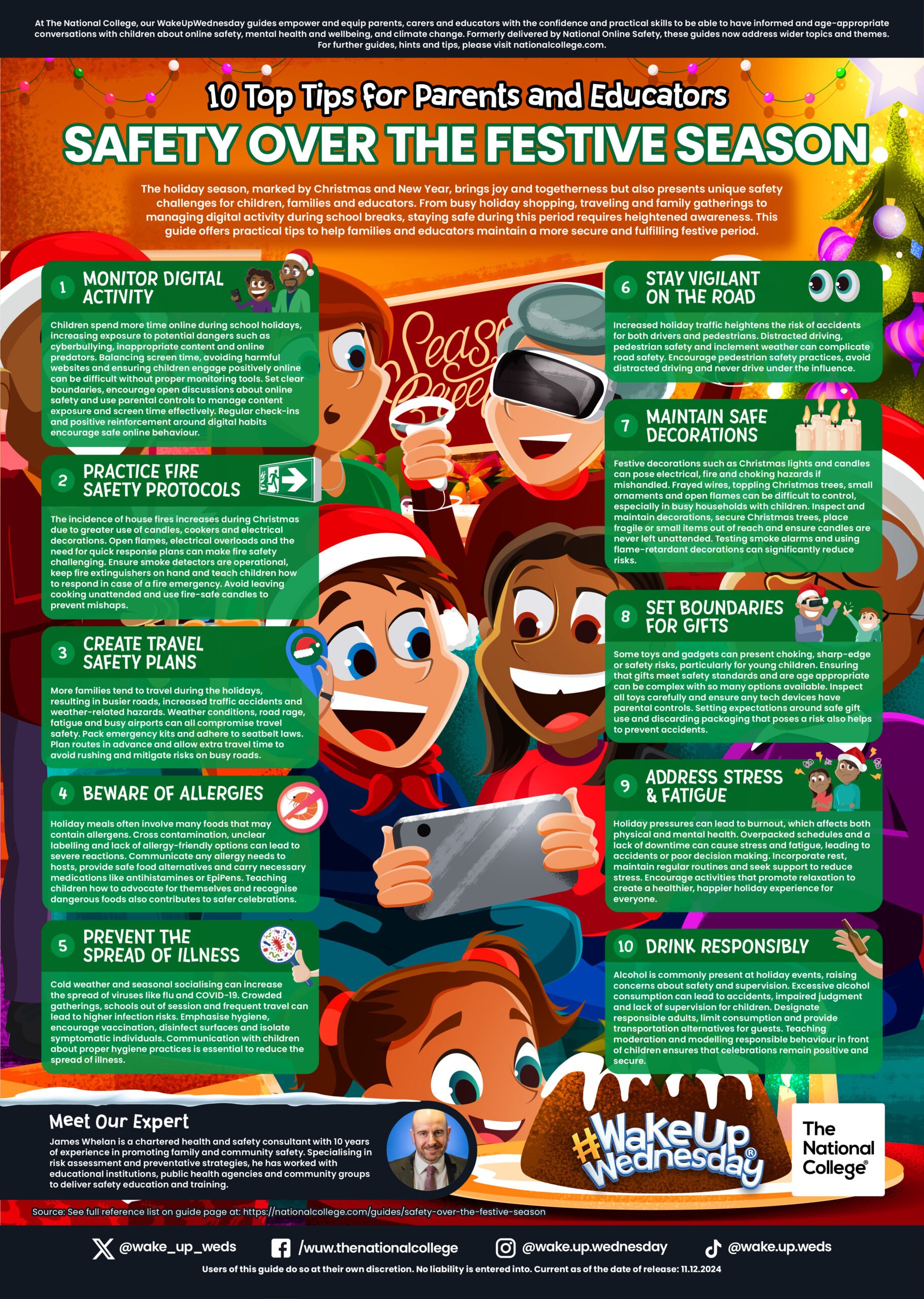
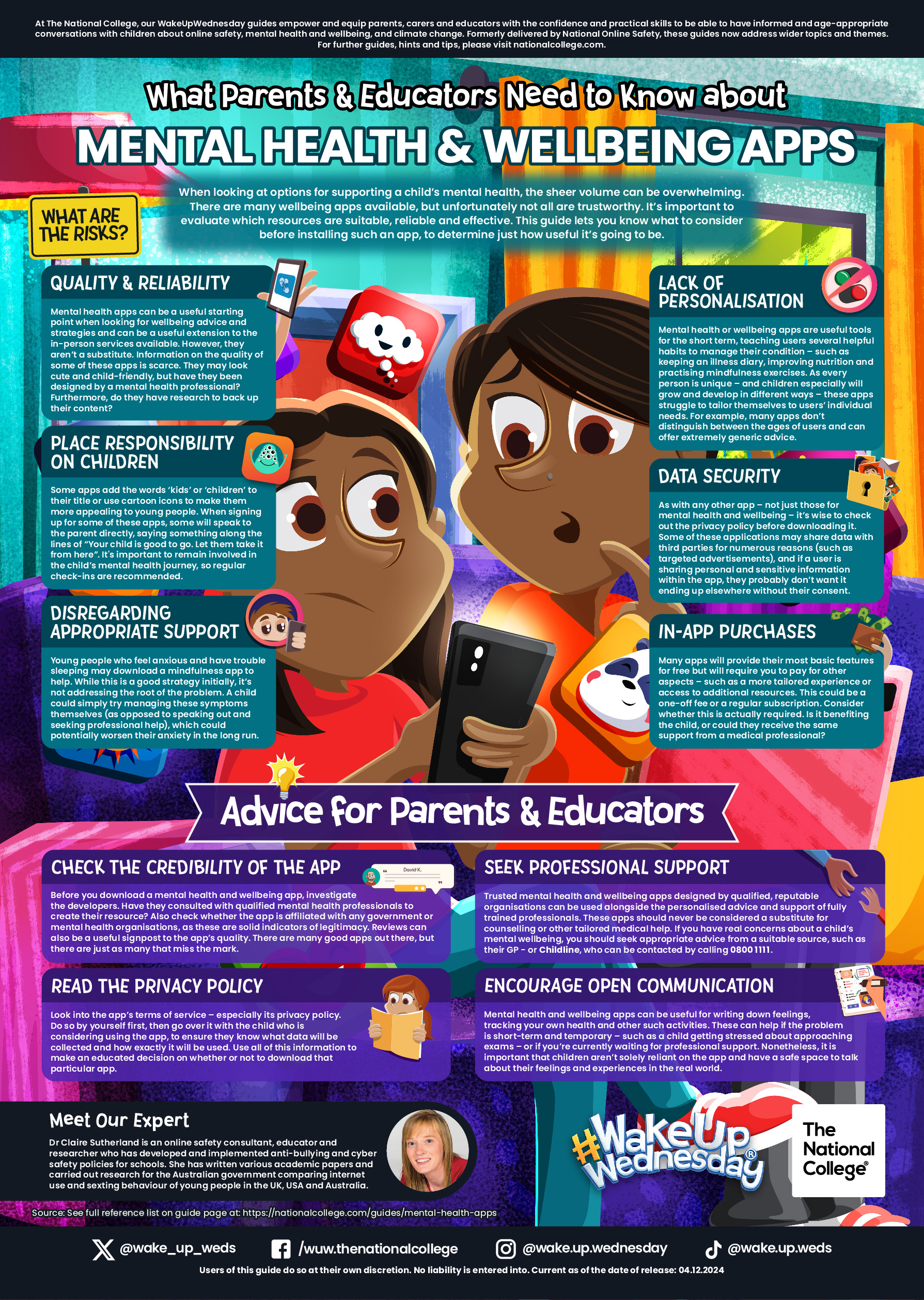
According to findings from the NHS, 1 in 5 children in England suffer from a probable mental health issue, with 420,000 treated for such problems every month. With such high numbers of young people in need of mental health support, it’s perhaps unsurprising that plenty of them have turned to using apps intended to help them through these kinds of challenges.
Unfortunately, there are plenty of risks associated with these services from data collection to a potentially unhelpful, impersonal experience. It can be difficult to know how to keep young users safe as they navigate these services, but this week’s free guide provides expert advice on how to do exactly that, while also breaking down the specific safety concerns of mental health and wellbeing app
Watch this space for all of examination timetables
2025 January Exam Timetable
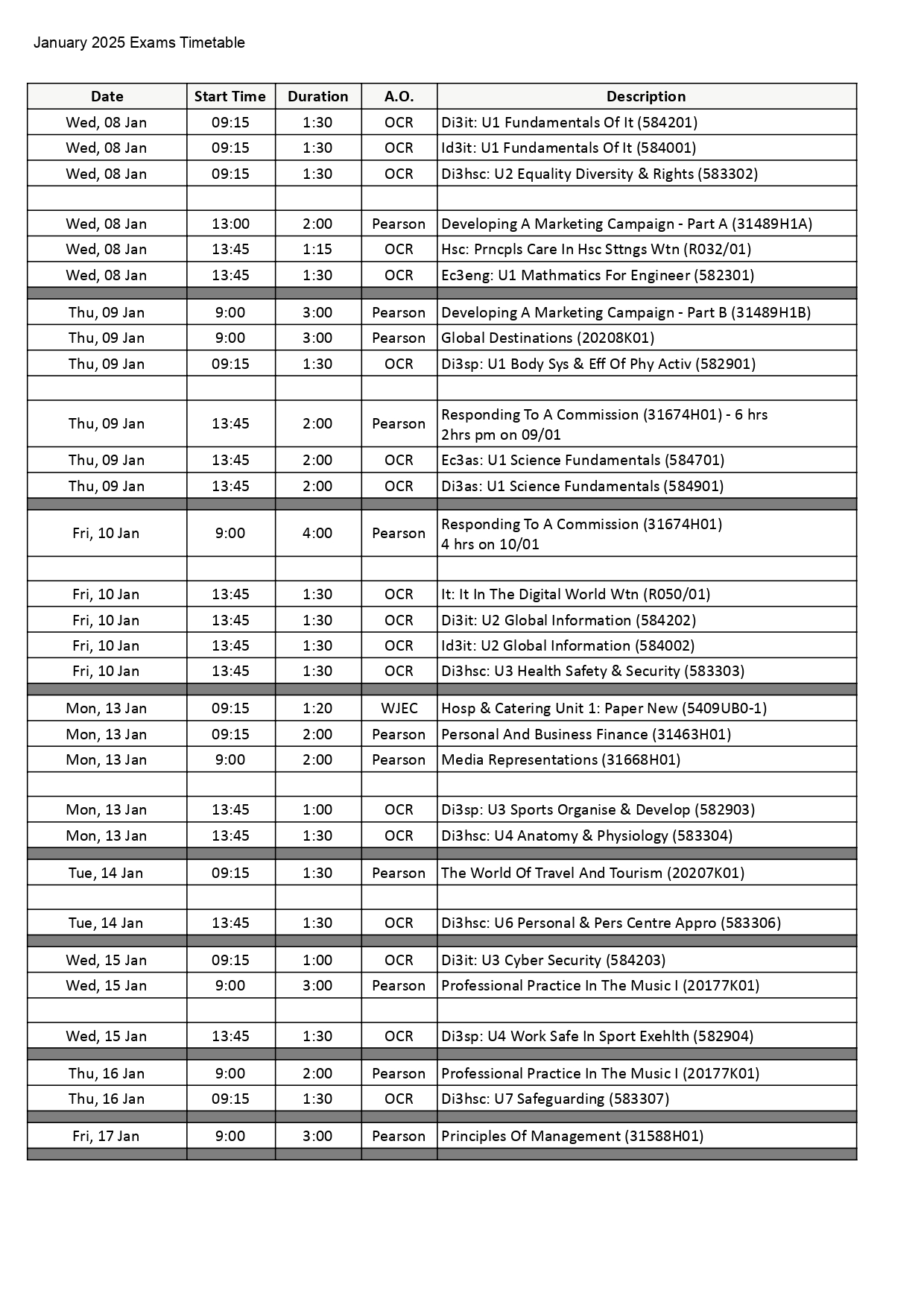
2025 Y11 January Mock Exam Timetable
